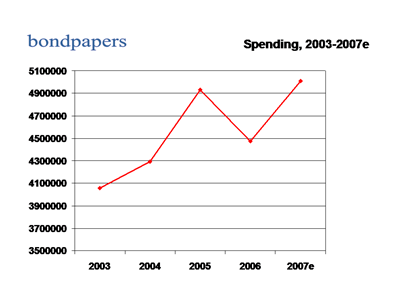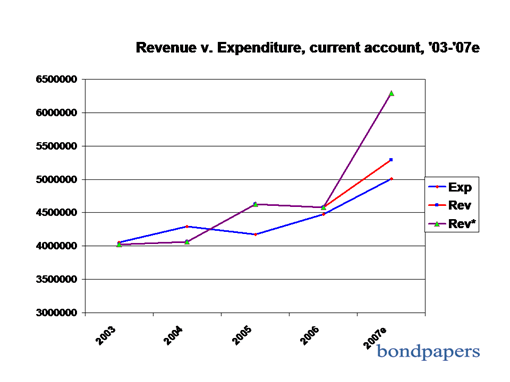Finance minister Tom Marshall tabled a record-setting interim supply bill on Tuesday, seeking almost $2.0 billion to cover government spending for the first third of the next fiscal year. Based on that, the provincial budget estimates will come in as close to $6.0 billion as not.
In comments last month, Marshall said that spending on health, education and social welfare will consume 70% of spending in the coming fiscal year. At the same time, Marshall has been talking up the need to deal with the provincial government's debt load.
Bond Papers has noted before that Marshall's comments on the debt, while apparently sincere, have a hollow ring about them. After all, Marshall has served since 2003 in a cabinet that has been doing plenty of talking about the provincial debt, yet the same cabinet has done precious little about it.
In fact, a closer look at government spending over the past four years shows the extent to which the current cabinet has followed a fiscal policy built on a house of cards.
 Figure 1, left, shows the growth in provincial government spending from 2003 to 2007. Overall, spending has increased 23% and consistent with the planned spending for the current fiscal year, this figure is more than double the cumulative rate of inflation in the same time period. [Note: Amounts shown are in thousands of Canadian dollars unless otherwise noted.]
Figure 1, left, shows the growth in provincial government spending from 2003 to 2007. Overall, spending has increased 23% and consistent with the planned spending for the current fiscal year, this figure is more than double the cumulative rate of inflation in the same time period. [Note: Amounts shown are in thousands of Canadian dollars unless otherwise noted.]
Some specific categories of spending have increased more dramatically. Spending on the natural resources department, tourism, innovation, and agriculture has grown by 55%. Transportation and communications spending has grown by 43% and spending on general government operations was 53% higher in 2007 than it was in 2003.
Spending in other departments grew by lesser amounts. For example, health - by far the largest single spending item - received $1.64 billion in 2007, up from $1.3 billion in 2003.  [Figure 2, right, below] That represents an increase of 26.4%. Education is up by 20.5% and social welfare spending has increased by 15%.
[Figure 2, right, below] That represents an increase of 26.4%. Education is up by 20.5% and social welfare spending has increased by 15%.
Debt servicing, interestingly enough, has actually declined by 6% and dropped consistently from 2003 until the 2007 estimates. For some inexplicable reason, the finance department predicted an increase in debt servicing.
It's inexplicable since the current exchange rate coupled with low interest rates would suggest that the cost of merely paying the interest on public debt would continue to decline.
Even at an estimated $511 million for 2007, debt servicing consumes a mere 10% of the annual provincial budget. Compare that to health care,for example, at 32% of expenditure or education at about 20% of spending. Debt servicing is the only category of government expenditure to experience any decrease in the past four years.
 And that reduced servicing cost isn't due to any government action. Contrary to the popular impression, the current administration has actually increased the public sector debt load, that is the accumulated deficits and direct borrowing. [Figure 3, left] Direct debt, that is the amount owed directly by the provincial government had been declining steadily for the years before 2005. Since then, it has been increasing.
And that reduced servicing cost isn't due to any government action. Contrary to the popular impression, the current administration has actually increased the public sector debt load, that is the accumulated deficits and direct borrowing. [Figure 3, left] Direct debt, that is the amount owed directly by the provincial government had been declining steadily for the years before 2005. Since then, it has been increasing.
Total debt, that is direct debt plus debt owed by Crown agencies, is $500 million larger in 2007 than it was in 2003, the last year of the Roger Grimes administration.
To make the point absolutely clear, bear in mind that the debt has increased at the same time that provincial government revenue has increased at an unprecedented pace.
Revenue growth is driven entirely by high oil prices and mineral prices; that point has been made repeatedly by Marshall and his predecessor. That revenue growth has permitted the spending increases from Figure 1. That revenue growth comes from non-renewable resources and the peculiar global market situation which cannot be expected to last.
 The extent of the revenue growth, though, is often lost in recent public commentary that focuses entirely on surpluses, especially the surplus of nearly $1.0 billion estimated for the current fiscal year.
The extent of the revenue growth, though, is often lost in recent public commentary that focuses entirely on surpluses, especially the surplus of nearly $1.0 billion estimated for the current fiscal year.
Figure 4, right, compares spending growth with revenue growth. The red line shows revenue growth as estimated in the original 2007 budget. The purple line represents an additional $1.0 billion in revenue. That may overstate the result this year, but if it does, then the exaggeration is not that great.
Finance minister Tom Marshall's second budget will increase the steep upward climb in public spending, fuelled entirely by anticipated growth in revenues from two economic sectors.
The provincial government's budget policy is built on a fiscal house of cards. In the next post in this series, we'll take a look at the provincial economy as a whole, with some projections as to what may occur in the near to medium term.
-srbp-